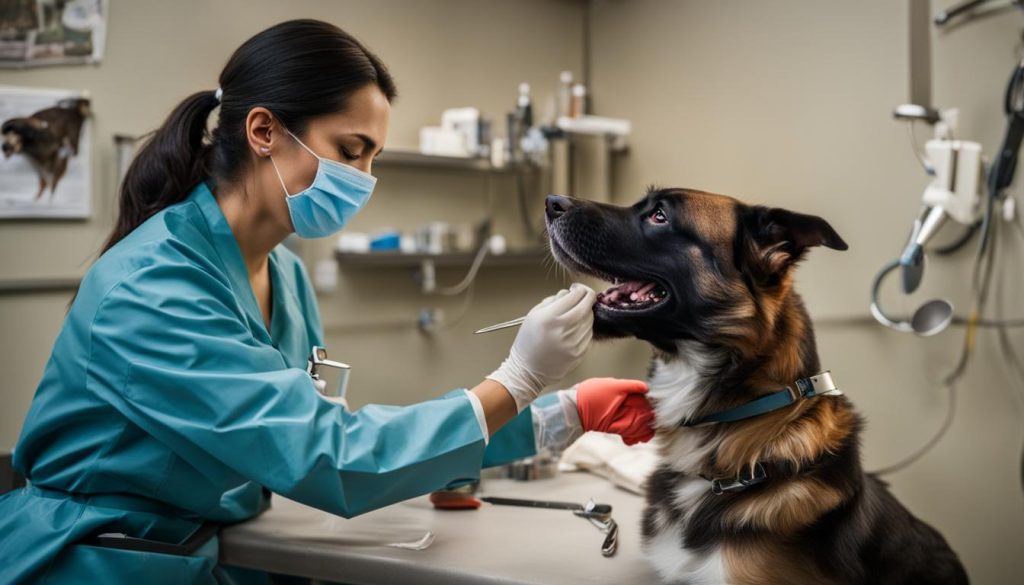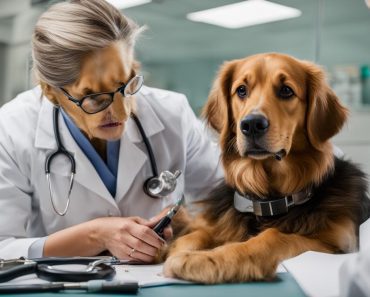Taking care of your puppy’s health is crucial for their overall well-being. From puppy proofing your home to choosing the right food, there are several important factors to consider. One of the most essential aspects of dog care is regular veterinary check-ups. These check-ups, also known as dog check-ups or dog health checks, involve a thorough examination by a veterinarian to ensure that your furry friend is in optimal health. Regular check-ups can help detect any potential health issues early on and ensure that your dog is receiving the necessary preventive care. It is recommended to schedule an annual dog check-up or pet wellness visit to maintain your pup’s health.
Key Takeaways:
- Regular veterinary check-ups are crucial for your dog’s overall well-being and preventive care.
- These check-ups help detect potential health issues early and ensure proper care.
- Schedule annual dog check-ups to maintain your pup’s health.
- Veterinary examinations include physical assessments, vaccinations, and discussions about your dog’s health concerns.
- Potty training and oral care are important aspects of dog health and should be prioritized.
The Importance of Regular Vet Visits
Regular vet visits are essential for maintaining your dog’s overall health and well-being. These visits, often referred to as annual dog check-ups or routine dog health checks, are a crucial part of preventive dog care. During these check-ups, your veterinarian will conduct a thorough examination of your dog to assess their overall well-being and detect any potential health issues early on.
One of the key elements of a vet visit is the physical examination. The veterinarian will carefully examine your dog’s weight, temperature, heart and lung function, as well as assess their eyes, ears, teeth, and coat. This comprehensive examination allows the vet to identify any signs of illness, abnormalities, or underlying health conditions.
In addition to the physical examination, regular vet visits also include necessary vaccinations to protect your dog against common diseases. Vaccinations play a crucial role in preventive dog care, helping to safeguard your furry friend’s health and prevent the spread of contagious diseases.
Furthermore, regular vet visits provide an excellent opportunity for you to discuss any concerns or questions you may have regarding your dog’s health and well-being. Whether it’s dietary recommendations, behavior issues, or general care tips, the veterinarian can offer valuable advice and guidance to help you better care for your dog.
By scheduling annual dog check-ups and making them a part of your routine dog care, you ensure that your furry friend receives the necessary medical attention they need to stay healthy and happy. Preventive dog care is key to detecting and addressing health issues early, promoting a long and fulfilling life for your beloved companion.
Benefits of Regular Vet Visits:
- Early detection of potential health issues
- Preventive care through vaccinations
- Comprehensive physical examination
- Opportunity to discuss concerns and questions
- Promotes overall health and well-being
Regular veterinary examinations are vital for ensuring the optimal health of your dog. By prioritizing annual dog check-ups and preventive dog care, you can provide your furry friend with the care they need to lead a healthy and vibrant life.
What to Expect During a Vet Visit
When you take your dog for a vet visit, you can expect a series of procedures to be conducted. The veterinarian will start by examining your dog’s overall physical condition, including checking for any signs of illness or abnormalities. This dog examination is crucial in ensuring that your furry friend is in good health.
In addition to the physical examination, the vet may also take a stool sample to test for internal parasites. This dog veterinary examination is necessary to detect and address any potential parasite infestations. During the visit, the veterinarian will discuss parasite control measures to keep your dog protected.
Vaccinations are an important part of regular dog check-ups. The vet will administer the required vaccines as per the recommended schedule to protect your dog against various diseases. These vaccinations play a vital role in maintaining your dog’s health and preventing the spread of contagious illnesses.
During the vet visit, your dog’s toenails may also be trimmed to ensure proper foot health. Trimming your dog’s nails helps prevent discomfort and potential issues with walking or running. It’s a simple procedure that contributes to your dog’s overall well-being.
In certain cases, the veterinarian may order additional tests, such as a complete blood count or urine analysis, to gain further insights into your dog’s health. These tests provide valuable information about your dog’s internal health and aid in early detection and treatment of any potential health issues.
Overall, a regular dog check-up is a comprehensive examination that helps ensure your dog is in good health and allows for early detection and treatment of any potential health issues. By prioritizing regular vet visits, you can provide your furry friend with the necessary care and attention to lead a happy and healthy life.

The Importance of Potty Training and Oral Care
Potty training is an essential aspect of dog care. It is important to start potty training your dog from an early age to instill good bathroom manners and prevent accidents in the house. By establishing a routine and consistently taking your dog to the designated potty area, you can effectively train them to eliminate in the appropriate place.
Additionally, oral care is crucial for your dog’s overall health. Dogs are prone to dental issues, including tooth loss and periodontal diseases. Introducing oral care early on, such as regular teeth brushing or using dental treats, can help maintain your dog’s dental health and prevent potential dental problems in the future.
Conclusion
Regular dog check-ups are crucial for maintaining your furry friend’s health and well-being. These check-ups, conducted by a veterinarian, play a vital role in ensuring that your dog is in optimal health and allow for early detection of any potential health issues.
By prioritizing preventive dog care, including regular vet visits, potty training, and oral care, you can contribute to keeping your dog happy and healthy for years to come. Scheduling annual dog check-ups and following your vet’s recommendations for vaccinations, parasite control, and overall wellness are essential for the long-term well-being of your pet.
Remember, a proactive approach to your dog’s health is key. By providing regular veterinary care, you can help prevent and address any health issues promptly. Taking care of your dog’s health not only ensures their happiness but also strengthens the bond between you and your beloved companion.
FAQ
Why are regular vet visits important for my dog?
Regular vet visits are important for your dog because they help ensure that your furry friend is in optimal health and allow for early detection of any potential health issues. They are also a crucial part of preventive dog care.
What happens during a dog check-up at the vet?
During a dog check-up at the vet, your veterinarian will conduct a physical examination to assess your dog’s overall well-being. This includes checking weight, temperature, heart and lung function, as well as examining the eyes, ears, teeth, and coat. Vaccinations may also be administered, and additional tests may be performed if necessary.
How often should I take my dog for a check-up?
It is recommended to schedule an annual dog check-up or pet wellness visit to ensure that your pup’s health is maintained. However, the frequency may vary depending on your dog’s age, breed, and any specific health concerns. It’s best to consult with your veterinarian for a personalized recommendation.
What is the importance of potty training and oral care for my dog?
Potty training is important for teaching your dog good bathroom manners and preventing accidents in the house. Oral care is crucial for your dog’s overall health as it helps prevent dental issues such as tooth loss and periodontal diseases. Incorporating these practices early on can help maintain your dog’s health and well-being.
How can I maintain my dog’s dental health?
You can maintain your dog’s dental health by introducing regular teeth brushing or using dental treats. This helps prevent dental problems and keeps your dog’s teeth and gums healthy. It’s also important to schedule regular dental check-ups with your veterinarian for professional cleaning if needed.






